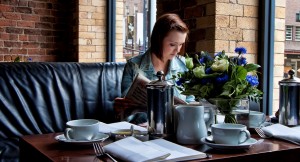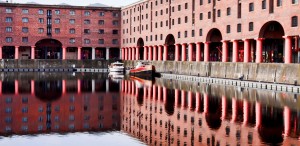
Liverpool, a city with a glorious history as a mercantile hub and gateway to the New World, is today a key destination for art lovers, fans of the theatre and museum-goers. The very name of the city invokes images of a magnificent nautical history, two of the Premiership’s biggest football teams and two majestic Cathedrals. Yet relatively few visitors, other than Beatles devotees, put Liverpool on their vacation itineraries. Liverpool has always been a big music city, from The Beatles to Elvis Costello, Echo and the Bunnymen to The La’s, and Atomic Kitten. But now it’s official: The Guinness Book of Records has named Liverpool the World Capital of Pop.
This means music fans must at least do a trip to The Beatles Story at Albert Dock, a brilliant tour through the Beatles’ lives, with fascinating Fab Four memorabilia and insights from friends and family. But there is much more to the city than its fame as birthplace of the the Beatles, especially after a two-decade-long improvement mission that has elevated Liverpool from a town of gritty realities to “European Capital of Culture” — an official accolade bestowed in 2008 that recognises the city’s resurgence. Now it’s bulging with fabulous new shops, buzzing new restaurants, hip hotels and trendy wine bars, as well as a world-class cultural offering with more museums and galleries than anywhere outside of London.
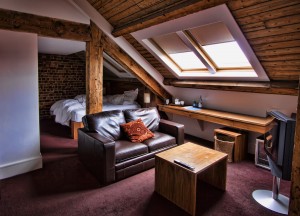
Precisely in the centre of the Georgian cultural quarter, surrounded by listed buildings, places of learning and excellent dining experiences and directly across from the Philharmonic Hall, is the Hope Street Hotel. It was voted by Condé Nast Traveller as one of the “World’s 50 Coolest Hotels.”
The older part of the hotel has an immaculate brick façade that was once home to 19th-century coach and carriage builders. After purchasing the building next door, the more recent addition has an impressive black glass frontage, which leads to the softly lit minimalist lobby and bowed oak reception desk. The all-in-black staff buzzed around productively and swiftly checked me into room 417.
An oak stairwell with immense beams, stiff metal cables and bare brickwork is at the heart of the hotel — a theme that is continued throughout and includes solid birch and oak floorboards warmed by under-floor heating.
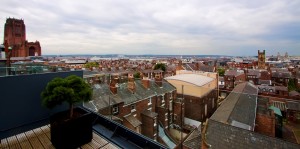
The centre-piece of each of the 80 contemporary rooms (and nine suites) which incorporate natural wood, bare floors and burgundy leather is the super king-size bed (the kind you cannot resist diving onto), draped in crisp white Egyptian cotton. The bathroom’s walk-in shower with oversized shower head, mist-free mirrors and REN products were a great finishing touch, as was as the free in-room Wi-Fi, flat-screen televisions and tea/coffee-making facilities.
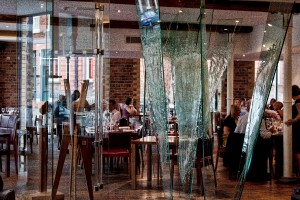
Noted as one of the top 10 restaurants outside of London, Chef Paul Askew has won his renowned London Carriage Works countless awards. The fine dining zone, housed in the high ceilinged industrial-Victorian part of the hotel, has huge windows, original warehouse wrought-iron pillars, contemporary art and triangular sheets of shard-ed glass pierced into the ceiling and anchored onto the floor. The atmosphere is busy, with a never-ending wine list and an interesting modern British menu using seasonal and local ingredients.
To start I ordered sea trout and cucumber tagliatelle with Welsh mussels in a white butter sauce (Askew slipped in a little coriander which brought it all together). My main was Lakeland pork with celeriac, which worked well with the puree sautéed potatoes; the caramelised apples offset the broccoli and radishes. I liked the suggested glass-of-wine option priced into the à la Carte menu – and the local cheeses were excellent.
Taking into account the fabulous location, the trendy yet functional rooms and of course, the unbelievable food, you’ll struggle to match this in another UK city.
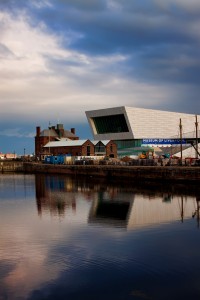
Doubles start at £79 room only – book your breakfast online and pay only £10 extra each. The Lazy Sunday offer includes breakfast and dinner for two – £120. My £15 two-course dinner was ordered from the fixed price menu (have your order in before 6.30pm); a three-course meal from the same menu costs £20.
Liverpool boasts numerous stunning parks, botanical gardens and quiet little coffee shops – should you wish to escape from the buzz. Particularly fetching are its award winning beaches and coastal walks – ideal for a sunrise stroll to blow away the city cobwebs.
Hope Street Hotel, 40 Hope Street, Liverpool, ph 0151-7093000
